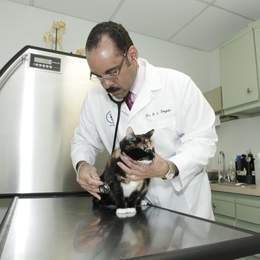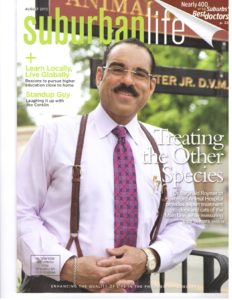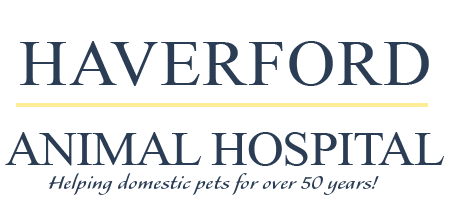Haverford Animal Hospital Awards
the Best of the Main Line
Best Veterinarian
2021
the Best of the Main Line
Best Veterinarian
2020
the Best of the Main Line
Best Veterinarian
2019
the Best of the Main Line
Best Veterinarian
2017
the Best of the Main Line
Best Veterinarian
2016
the Best of the Main Line
Best Veterinarian
2014
the Best of the Main Line
Best Veterinarian
2013
the Best of the Main Line
Best Veterinarian
2012
the Best of the Main Line
Best Veterinarian
2011
the Best of the Main Line
Best Veterinarian
2010
the Best of the Main Line
Best Veterinarian
2009
the Best of the Main Line
Best Veterinarian
2008
the Best of the Main Line
Best Veterinarian
2007
the Best of the Main Line
Best Veterinarian
2006
the Best of the Main Line
Best Veterinarian
2005
the Best of the Main Line
Best Veterinarian
2004
the Best of the Main Line
Best Veterinarian
2001
Articles featuring Dr. Royster and Haverford Animal Hospital:
SuburbanLife Magazine – August 2013 issue:
 Treating the Other Species
Treating the Other Species
Dr. Reginald Royster of Haverford Animal Hospital treats the dogs and cats belonging to his Main Line clients while providing reassurance to their owners
by Sharon A. Shaw
While our pets often become integral members of the family, there are some crucial differences in their needs, their ability to communicate and their lifespan. “Pets have always been important to us,” says Reginald L. Royster Jr., D.V.M. “In the last 15 to 20 years the human/animal bond has strengthened. Cats and dogs are our best friends and our children. As technology has increased our ability to diagnose and treat them, fortunately, our pets are longer lived.” This is especially important, he says, because of the increasing role they play as service animals, working dogs and companions to lonely seniors. “Pets keep you company. They give their owners something to focus on and not think of their own difficulties.”
Dr. Royster owns Haverford Animal Hospital, which has been serving pet owners from its location on Lancaster Avenue in Haverford since shortly after World War II. Dr. Royster purchased the practice from his mentor and predecessor, Dr. Carl Cousins, after working there during high school and being invited back to begin his career after earning his degree from the Tuskegee University School of Veterinary Medicine.
The practice provides wellness visits and dental services for canine and feline patients of all ages. He also performs general surgery and boasts a full laboratory for evaluations, X-rays and ultrasounds. “Pets ought to be seen at least annually, sometimes every six months depending on their immunization, and as they get older, we need to observe certain things,” Dr. Royster advises.
 “We like to consider ourselves a family practice,” he adds. “We have been in the community for 60 to 70 years. I have been here 23 years and I am the third veterinarian to serve the families who have been coming here for many years. We pride ourselves on being technologically efficient and modern but getting to know our patients. We like to get to know our patients and clients and establish a relationship with them. I am a solo practitioner, so they always get to speak with me. It provides consistency. … Some people are comfortable in large facilities. We are a smaller practice; we can give a personal touch. Our patients are not just a number.”
“We like to consider ourselves a family practice,” he adds. “We have been in the community for 60 to 70 years. I have been here 23 years and I am the third veterinarian to serve the families who have been coming here for many years. We pride ourselves on being technologically efficient and modern but getting to know our patients. We like to get to know our patients and clients and establish a relationship with them. I am a solo practitioner, so they always get to speak with me. It provides consistency. … Some people are comfortable in large facilities. We are a smaller practice; we can give a personal touch. Our patients are not just a number.”
Tobi Emanuel is one such patient—or, more accurately, the owner of several patients. Her bearded collies, Hannah and Oliver, are involved in performance sports, and both are titled in herding and agility. Her third dog—Reggie, a 15-month-old Cavalier King Charles Spaniel—is named after Dr. Royster (whose stylish dressing habits she admires), “with his permission,” Emanuel says.
“I have been with Dr. Royster since he took over the practice,” she explains. “In a nutshell, aside from the fact that he is extremely compassionate and knowledgeable, he never backs away from tough decisions, whether guiding you to say goodbye or calling in a specialist. He is open to alternative things, as well. I have never been made to feel that something I suggested was all feathers and bells. He is open to anything that makes the dog’s life better.” Emanuel says Dr. Royster even coached her squeamish husband through performing a minor procedure at home when she was hospitalized. “He’s great with the animals and the people,” she says.
She describes the difficulty she had years ago when her wire-hair terrier lost the use of her hind end. She asked the doctor for his recommendation and told her, “What you have is one half of a perfect dog. She’s not ready to throw in the towel but I understand if you are.” Because the dog was not ready to give up, Emanuel decided, and neither was she. “We worked out a treatment plan and a while later, after she had a mini-stroke and her expression was gone, he told me, ‘Now she is ready.’ He is compassionate and sensible.”
“It is never easy,” says Dr. Royster, “when you have to deal with patients’ families when the pets are terminally ill and we have to go down the road of contemplating end-of-life issues.”
Making Friends
Kathy Marshall has been bringing her pets to Haverford Animal Hospital since 1965. She currently has four dogs, two cats and numerous koi. Her dogs, all of the Petit Basset Griffon Vendéen (PBGV) breed, participate in competitive agility sports and two hold the national Nos. 1 and 2 rankings for their category. Marshall says they sometimes experience “the injuries one would expect with athletes.”
“They are not a common breed,” she adds. “Reggie has been fabulous about recognizing their concerns and making sure I go to the right specialist. He does not blow me off; he listens to what I have and will even go out into the parking lot to observe their movement. He is very attuned to the individual dog. It’s nice to go to the vet where you don’t have to worry about who you are seeing. He knows my dogs; he knows their lumps.”
Marshall’s dogs certainly are individuals. “PBGVs are difficult pups. They name themselves,” she says. Hers are Trouble, Naughty, P.I.T.A. and T.S., short for Tough Sh*t. She describes Dr. Royster as being practical and direct when recommending treatment. “He will say, ‘You don’t have to do this.’ It’s not whether you have means or not; it is about what needs to be done or not, and when he says it does, I know he’s not yanking my chain. He will tell me if bubble gum will do the trick instead of Super Glue.”
“There is a balance you have to strike,” Dr. Royster explains. “I point out needs with courtesy and respect. You do not know what people are going through. I try to sit down and lay out the facts: why we need to address something. Sometimes a person’s finances limit their thinking but there is always some level of an option. Some patients are very anxious. Little things sometimes upset people and I need to calm and diffuse them if they are worried about something they do not need to be. An emergency is related to the individual’s emotional state at the time. It comes down to communication with humans—the other species—physiologically, not medically.”
“He is a genuinely nice person who cares about people and dogs,” Marshall says. “He is the best vet going. I certainly appreciate all the help and guidance and everything they do for me.” She is so grateful, in fact, that last November, when P.I.T.A., Trouble and T.S. all earned championships within one month, she took out an ad to personally thank Haverford Animal Hospital.
“My main goal is pet health care,” Dr. Royster says. “I love the challenge. I really enjoy practicing medicine: trying to diagnose and treat diseases, and I enjoy doing surgery.” But, he notes, “I have made a lot of good friends over the years.”
